
Technical analysis of Stalia olive oil
Discover a complete, technical, rigorous and visual study of the technical analysis of Stalia olive oil.

Greek salt, harvested for thousands of years on the sunny shores of the Mediterranean, is much more than just a condiment. It embodies ancestral know-how and a deep connection with the sea. Used in cooking since Antiquity, Greek sea salt is distinguished by its purity and rich mineral content. This natural, unrefined product has become a benchmark for chefs and food lovers the world over. Greece, with its countless islands and long coastlines, offers ideal conditions for producing salt of exceptional quality.
Salt plays a fundamental role in Greek history, dating back to Minoan times. In those days, salt was not just a seasoning, but a precious commodity. The Greeks used salt as a currency, facilitating trade transactions across the Mediterranean region. The ancient Greeks were well aware of its virtues for preserving food, especially in such a hot climate. In fact, salt preserved fish, meat and even certain cereals so that they could survive the hottest months without spoiling.
Greece’s rocky coastline and climatic conditions provided ideal conditions for salt harvesting. Salt crystals were formed by the evaporation of seawater. This know-how has been passed down through the ages. Natural salt works, called “alykes” in Greek, still exist today in regions such as Messinia, the Cyclades and Crete. These sites bear witness to the ingenuity of the ancient Greeks. They knew how to produce salt and use it in their daily lives.
The Greek coasts offer ideal conditions for salt harvesting. Thanks to their geographical location, the salt-growing regions benefit from constant sunshine and intense heat in summer, favoring the rapid evaporation of seawater. Sea breezes accelerate this natural process. The saltwater breeze allows air to circulate around the crystals, preventing excessive humidity. These factors create the perfect environment for producing pure, mineral salt. Greek salt works, particularly those in Crete and Messinia, have become benchmarks in the production of quality salt.
Salt harvesting in Greece follows an artisanal process that has changed little over the centuries. Workers collect salt by hand, using wooden shovels and rakes. This skill requires great technical mastery and remarkable patience. Once harvested, the salt dries in the sun for several days. This process is essential to guarantee its purity. Even today, this traditional method produces a rare and precious salt, appreciated by chefs and for its therapeutic benefits.
The salt harvesting process can vary according to climatic conditions. Depending on the intensity of summer and temperatures, evaporation can take place in a matter of days or several weeks. June to September are the best months for harvesting, with maximum sunshine. After evaporation, the salt crystals form on the surface of the basins and are then collected. Harvesting is a seasonal process, involving a number of stages, from observing the weather to planning the collection for optimum yield.
Classic sea salt is the type most commonly used in Greece. Salt is harvested from coastal saltworks, notably in Crete, Messinia and the Cyclades. This salt is generally larger than industrial table salts, with a crystalline, slightly rough texture. It is ideal for everyday use in the kitchen, particularly for seasoning salads, meat and fish. Its natural, pure and light taste makes it a staple in every Greek household.
Fleur de sel is a rare and precious variety, often referred to as the “caviar of salt”. It forms in thin layers on the surface of salt ponds on hot, windy summer days. This delicate crystallization is harvested by hand, with great precision. The harvesting process is a slow one, requiring great care to preserve the quality of the fleur de sel. Appreciated for its light texture and subtle taste, fleur de sel is perfect for seasoning refined dishes, such as grilled vegetables, seafood or even desserts. Its mildness enhances natural flavors.
Some regions of Greece produce flavored salts, true Mediterranean specialties. Enriched with local herbs such as oregano, thyme, lavender or mint, these salts delicately perfume dishes. They are often used to enhance souvlaki, Greek salads or grilled fish. Their fragrant taste adds a unique depth to recipes, reducing the need for other seasonings such as pepper. This flavored salt can also be used to sprinkle on fresh breads or roasted vegetables, adding a Mediterranean touch to your dishes.
Another distinctive salt comes from the island of Crete. Cretan salt works, located along the coast, benefit from the ideal conditions created by the local climate. As a result, this salt has a finer texture, lighter color and milder taste than other salts. It is renowned for its purity and health benefits, thanks to its low sodium content and natural minerals. As a result, it fits perfectly into Cretan cuisine, a mainstay of the Mediterranean diet, and is commonly used in traditional Cretan dishes.
Mediterranean salt, harvested on the coasts of the Aegean and Ionian Seas, is highly prized. It is generally finer than Atlantic salt, and rich in beneficial minerals. This salt is distinguished by its slightly sweet taste and delicate texture. It is frequently used in Mediterranean recipes and meat dishes, such as roast lamb. It is also ideal for light sauces and vinaigrettes.
Greek salt, especially traditionally harvested salt, is high in natural minerals. In addition to sodium, it is rich in magnesium, calcium and potassium, essential elements that confer health benefits. Unlike industrial refined salt, it retains its nutritional properties and unique texture. This salt often has a less salty taste, allowing it to be used in cooking without excess. Its distinctive, slightly sweeter taste makes it particularly appreciated in Mediterranean dishes. Because of its artisanal nature, fleur de sel is also considered a luxury product. It offers an authentic taste of the Aegean and the Mediterranean.
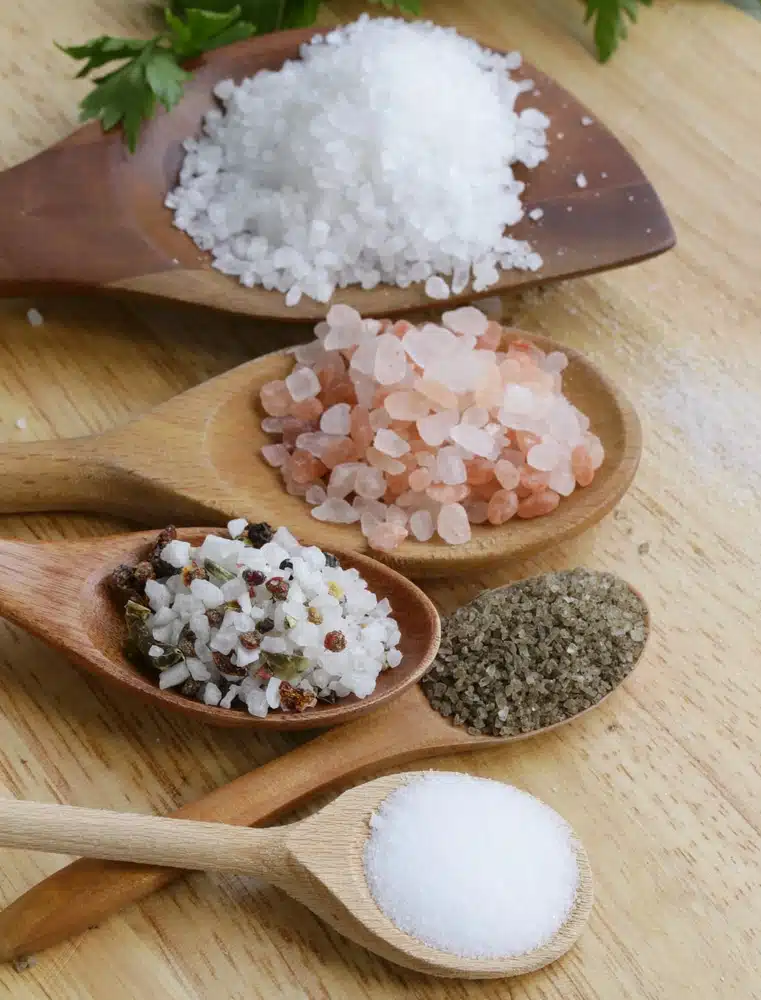
Greek salt, particularly sea salt and fleur de sel, is rich in essential minerals such as magnesium, calcium and potassium. These minerals play a crucial role in the body. They regulate water balance, promote muscle contraction and facilitate the transmission of nerve impulses.
Greek salt is naturally rich in minerals not found in refined table salt. Magnesium supports heart health by promoting optimal blood circulation. Calcium and potassium help maintain strong bones and stable blood pressure. These minerals also help reduce the risk of muscle cramps, particularly after physical exertion.
Because of its mineral and nutrient content, Greek salt can also act as a quick energy boost, which is essential during physical activity or long working days. It promotes rehydration by combining sodium and potassium, two elements that help restore the body’s water balance. This makes Greek salt an excellent choice for athletes and active people, especially during the warmer months, when dehydration is more common.
In addition to its nutritional benefits, Greek salt, particularly fleur de sel, is recognized for its natural antimicrobial properties. These properties help to preserve food in a healthier way by inhibiting the growth of certain micro-organisms. For this reason, it is traditionally used to preserve products such as olives and cheeses, while preserving their natural flavors.
Salt, when consumed in moderate quantities, is also beneficial for digestion. It stimulates the production of saliva and gastric juices, facilitating the digestive process. The result is better absorption of nutrients. In Greece, it is commonly used in marinades and preserves, as well as in dishes such as soups and sauces. Salt balances flavors while supporting optimal digestion.
Greek salt’s ability to regulate water balance and hydration also plays a role in blood circulation. High-quality salt, such as that sourced from Greek salt flats, helps maintain proper blood volume, essential for good circulation. This can promote better oxygenation of cells and tissues, contributing to better overall health.
Greece is home to several regions renowned for the quality of their salt, a precious product rooted in local history and culture. Each region offers a unique variety of salt, reflecting Greece’s geographical and climatic particularities. Here’s an overview of the main salt-producing regions in Greece:
The Messolonghi saltworks, located in the Gulf of Patras, are among the most famous in Greece. These historic saltworks produce salt of the highest purity, harvested by evaporation of seawater in shallow basins. Messolonghi salt is particularly prized for its crunchy texture and slightly sweet taste. The traditional, environmentally-friendly harvesting method helps preserve local ecosystems while guaranteeing quality production. This salt is often used in Greek cuisine and for preserving foods such as olives and fish.
The Cycladic islands of Naxos and Santorini are home to salt works that blend perfectly into the picturesque Aegean landscape. Here, salt is harvested in traditional basins, amid breathtaking scenery. The Mediterranean sun and sea breezes contribute to the formation of salt crystals of exceptional quality. Cycladic salt is distinguished by its light texture and delicate taste, ideal for spicing up local dishes, especially seafood and grilled vegetables.
The island of Crete, famous for its biodiversity, also produces quality salt in the Lassithi region. This salt is rich in minerals such as magnesium and calcium, giving it an intense, unique flavor. Harvested from salt pans close to the sea, Lassithi salt benefits from ideal climatic conditions for optimal crystallization. It is not only used in cooking, but also appreciated for its nutritional benefits. It is often used in marinades, preserves and in the preparation of traditional Cretan cheeses.
In addition to these major regions, other areas of Greece produce high-quality salt. For example, the Kalloni saltworks on the island of Lesbos produce a finely crystallized salt. It is often used in Mediterranean cuisine for its purity. The Karla saltworks in the Thessaly region also produce a highly appreciated salt. Each region brings its own unique touch, influenced by its climate, geographical conditions and traditional harvesting methods.
Salt production in Greece is based on traditional methods that respect both the environment and local practices. Here’s an overview of its ecological and economic impact:
Salt harvesting in Greek salt works, such as those in Messolonghi and Crete, relies primarily on the natural evaporation of seawater. This process, which uses solar and wind energy, minimizes the carbon footprint and preserves natural resources. Unlike industrial methods, no fossil fuels or chemical treatments are used, making Greek salt production more environmentally friendly. This respect for nature also helps maintain the ecological balance of coastal areas, promoting local biodiversity.
Salt production in Greece has a significant economic impact, especially in rural and island regions. Traditional salt works are a source of income for many local families, who are involved in the harvesting and processing of salt. They also create jobs in complementary sectors such as handicrafts and tourism. Salt is frequently sold at local markets. It also contributes to the growth of eco-tourism, where visitors discover traditional production methods and admire the picturesque landscapes of the salt flats.
Eco-tourism is developing rapidly in Greece, and salt production plays a key role. Indeed, many salt works open their doors to visitors, offering the chance to discover this age-old process. Tourists can also enjoy the beauty of the coastal scenery. Not only does this type of tourism support local economies, it also raises visitors’ awareness of sustainable, environmentally-friendly farming practices.
Salt produced in Greece is often sold as an authentic product, made using artisanal, environmentally-friendly methods. This gives Greek salt added value, making it popular not only on local markets, but also internationally. Its reputation for quality and sustainability encourages its export, strengthening the local economy and raising Greece’s profile on the world market.
Salt has played a crucial role in Greek culture throughout history. From its symbolic use in ancient rituals to its status as a world-class product today, here’s an overview of its evolution:
In ancient Greece, salt was not just a utilitarian product, but a sacred element. It was part of offerings to the gods, symbolizing purity and prosperity. During religious and funeral ceremonies, it was commonly used to purify and bless places and individuals. The spiritual value of salt has endured over the centuries, becoming an integral part of Greek religious rituals.
Salt had great economic value in ancient times. It served as a currency and facilitated commercial transactions. Its rarity and usefulness made it a precious commodity. It preserved food in the hot, dry Mediterranean climate. Salt was also essential for preserving meats, fish and vegetables, guaranteeing their shelf life throughout the year.
Over the centuries, salt has remained an essential resource in Greek cuisine. It was used to preserve foodstuffs such as olives, cheese and fish. It also brought a unique flavor to traditional dishes. Today, varieties such as fleur de sel and Messenian salt continue to enhance Mediterranean cuisine. These refined salts add a touch of perfection to meals, while retaining their historical and culinary role.
Today, Greece produces salt that is respected on the world market. Greek saltworks produce fine, aromatic salts that are found in kitchens the world over. This salt is sought after by chefs and gourmets for its purity and unique qualities, such as its rich mineral content and delicate texture.
Greek salt is a symbol of the richness and diversity of Greek culture. From its sacred roots, it plays an essential role in contemporary cuisine and continues to seduce local and international markets. It testifies to the ingenuity of the Greeks in using their natural resources, while preserving an enduring cultural heritage.
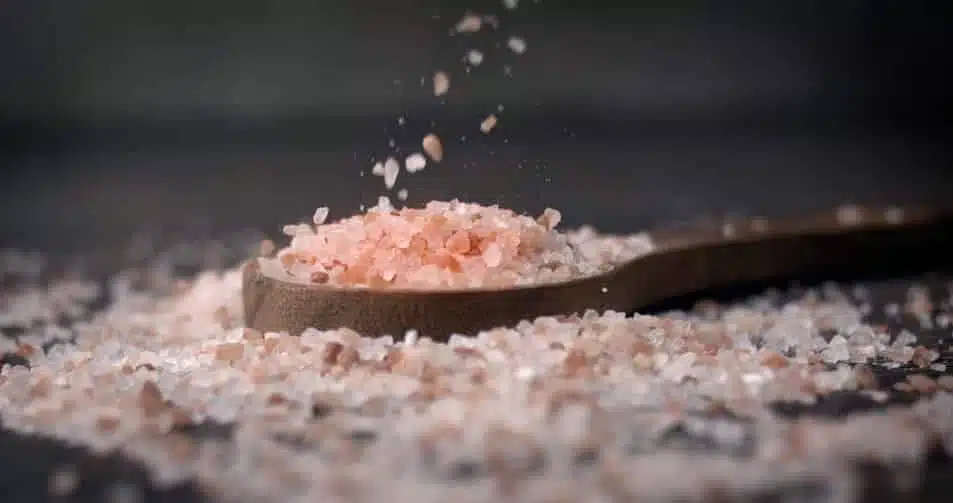
Unrefined salt is the best option, as it retains its natural minerals. Hand-harvested, artisanal salts are richer in minerals such as calcium, magnesium and potassium, providing more complex flavor and health benefits. Avoid refined salts, which lose much of their nutrients.
Good Greek sea salt should be white, sometimes slightly grayish due to the minerals it contains. Its texture should be fine but granular, with well-formed crystals. It should feel slightly rough to the touch, a sign of its natural harvesting.
Quality salt generally contains no additives. If you find salts containing preservatives or anti-caking agents, this often indicates industrial processing. Prefer simple, traditionally harvested salts that have not been altered by industrial processes.
Regions such as Messolonghi, Crete and the Cyclades are renowned for their high-quality salt production. These coastal areas, with their natural salt flats, offer ideal conditions for producing pure, hand-harvested sea salt. Buying salt from these regions guarantees an authentic, artisanal product.
Incorporating Greek salt into everyday cooking means adopting a culinary ritual inspired by the Mediterranean. Every pinch, whether from the fleur de sel of Crete or the salt of Messolonghi, evokes the waves, the sun and the enchanting landscapes of Greece. It’s not just used for seasoning, but becomes essential in marinades, sauces and even natural body scrubs.
This pure, natural salt magnifies dishes while offering a unique sensory experience, awakening the senses with its delicate texture and aromas. By using it, we pay tribute to age-old know-how, while enjoying the benefits of an authentic product. Whether used to prepare Mediterranean dishes or for a beauty treatment inspired by ancient traditions, Greek salt enriches every aspect of our daily lives.
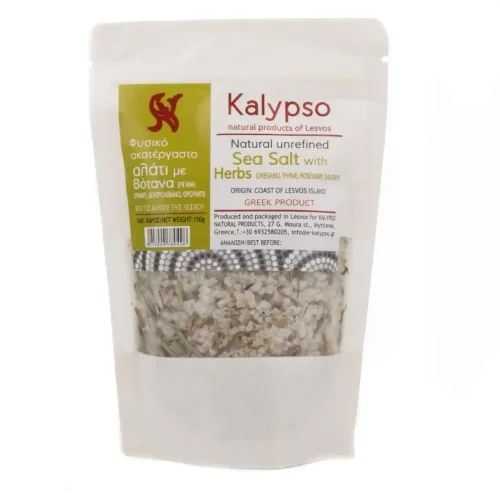
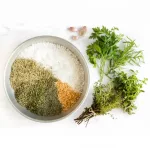
Natural sea salt with Lesvos Greek herbs (oregano, thyme, savory, rosemary) adds authentic flavor to your dishes.
Perfect for marinating meat and fish, without preservatives.
1,95 €
Crete | Producers | Craftsmanship | Contact | Shop | Olive wood | Palais des Grands Maîtres | Olive oil | Skiathos | Kefalonia | Hydra | Milos | Temple of Apollo | Paros | Olive oil | Lesvos | Recipe for saganaki | Tarama | Recipe for Keftedes | Greek yogurt | Tarama recipe | Rhodes | Thessaloniki | Greek honey | Figs | Honey Acropolis of Athens |
Recent articles

Discover a complete, technical, rigorous and visual study of the technical analysis of Stalia olive oil.

Discover a complete, technical, rigorous and visual study of the technical analysis of Eladaki olive oil.

The Festival of Athens and Epidaurus 2025, to be held from June 1 to August 24, celebrates 70 years of cultural history. This not-to-be-missed event combines ancient theater, classical music, opera, contemporary dance and innovative creations, spread between the Odeon of Herod Atticus in Athens, the ancient theater of Epidaurus, Peiraios 260 and other exceptional sites. With a rich, international program, advanced accessibility features, and an organization that cares about heritage and the environment, the festival offers a unique experience combining heritage, art and modernity.

Discover Delphi, the spiritual center of ancient Greece. Oracle, architecture, myths, sacred geography: immerse yourself in the history of a unique UNESCO-listed site, where legend, power and living heritage come together.
Disappeared over two thousand years ago, the Colossus of Rhodes continues to fascinate. Ranked among the Seven Wonders of Antiquity, this bronze giant dedicated to Helios symbolized power, resilience and Rhodian identity. Through ancient stories, works of art and modern projects, its myth endures. This article explores the history, construction and legacy of one of the most emblematic figures of the ancient world.
100% Greek products from local artisans, shipped from Rethymno in Crete!
Transactions protected by the latest European standards.
Any questions? We respond quickly and attentively.
We deliver worldwide with DHL tracked delivery.
 Accessories
Accessories
 Beverages
Beverages
 Cosmetics
Cosmetics
 Gift sets and kits
Gift sets and kits
 Grocery
Grocery
 Home and decoration
Home and decoration
 Non classifié(e)
Non classifié(e)